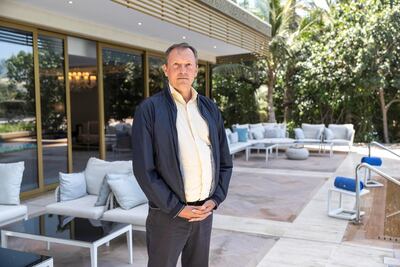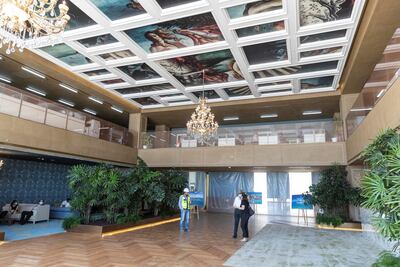The developer behind a luxury project on Dubai's World Islands said its first homeowners will move in this year – and that a desire for isolation could deliver more interest in the coming months.
Kleindienst Group said owners who bought into the Heart of Europe project would begin occupying villas on the man-made islands towards the end of 2020.
The project's 10 'palaces' featuring and private beaches have all been sold to mostly GCC buyers, though hundreds of smaller villas and flats remain under construction.
Chairman Josef Kleindienst said actual sales have dropped off due to the coronavirus pandemic, but there has been a rise interested parties.
"Our sales dropped more than 50 per cent since corona started," he told The National during a tour of the sprawling island development.
“New investors are not buying when they cannot visit."
But he said boats will begin taking investors over to the islands, 4km off the Dubai coast, from June 15.
Development on the World Islands has repeatedly stalled in the years following its construction in 2003 and handover to developers in 2008.
But significant progress on this latest project has been made in the past two years. Today, multistorey apartment and hotel buildings rise up from the low-lying islands.
Half a dozen floating 'seahorse villas' are lined up in a row and beachfront properties near completion.
Mr Kleindienst, an Austrian former police official turned businessman, said he would prove critics wrong.
“I guarantee you by the end of 2020, people will have moved into our villas, floating villas and hotels,” he said.
The restrictions that were put in place because of coronavirus "has only increased productivity here".
"Nobody was allowed on or off the islands, so we were able to get people to work longer hours and pay them overtime.”
Among the flagship properties is a Dh100 million beach palace on 'Sweden Island', now sold, with a price tag that rivals high-end Emirates Hills villas and Downtown penthouses.
Along with wealthy buyers, the project also relies on tourism spend to ensure it is a success.
Mr Kleindienst said the remote location would be attractive to people looking for a holiday, while maintaining social distancing.
“Towards the end of the year, when the project is open, there are two possibilities,” he said.
“Either a solution will have been found for the virus or we will be able to test everyone coming here.
“Everyone who is tested, and found not to have Covid-19, will be free to travel to the island and enjoy a holiday.”
Portofino and Cote D’Azure, the two hotels, together have almost 1,500 rooms, about the same as Atlantis on The Palm.
The global hotel industry is forecast to face significant challenges in the years ahead, but Mr Kleindienst insisted enough of the project has been sold to fund the rest of the work.
This week there were 1,200 workers on site pushed ahead with the hotels and apartments.
“Our master plan allows us to build 4,000 bedrooms. We have 2,000 under construction today," he said.
"We sold enough to fund what we are building.
“It is important for us to build only what can be sold.”
The first of the floating villas sold for Dh5 million, about the same as an upmarket villa in a wealthy Dubai neighbourhood, while the last one to be sold went for Dh20m, he said.
The project has had some setbacks along the way.
It was reported in 2018 that one of the floating villas had sunk near the Burj Al Arab.
Mr Kleindienst said it was an events platform that had fallen into the sea, not one of the prestigious floating villas, as reported by some media, but that it was enough to make buyers think twice about investing.
“We lost agreed sales because of that,” he said.
Despite the anticipated economic impact of the pandemic, there were 1,824 property sales in Dubai in April, worth Dh3.62 billion, according to Property Finder. Seventy per cent were off-plan projects that are still to be built.
John Stevens, long-standing property consultant in Dubai, said the Heart of Europe project could arrive on the market at the right time.
"Hotels that were offering packages during the quarantine period in Dubai did amazingly well," said Mr Stevens, managing director of property management firm Asteco, which is not involved in the islands project.
"Some had occupancy levels as high as 70 per cent and there seems to be a move to find nice locations to sit it all out.
"The question is how long will it continue for though?"
He also said private villas on a neighbouring island off Dubai were fully booked during the period when a permit was required to leave home and which ended on Friday, April 24.
"This is a huge development with expensive costs, it was never going to be easy to get it off the ground," he said.

"We are seeing island destinations doing well globally in lockdown and it does have a USP to be successful.
"It was not something that was going to pop up overnight."
The World Islands were in the headlines in 2018 when actress Lindsay Lohan announced plans to build her own themed resort there.
The American star of Mean Girls told her followers on Instagram she was planning to build "Lindsayland" in Dubai.
The post received more than 2,000 likes – before being deleted soon after.





















